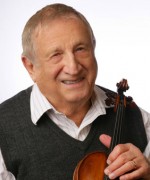Column Name
Title
Subhead
Jerome Wigler (Diploma ’41, violin) crouched over a can of slowly simmering “dog food,” a mash of beans that would be considered an abomination in the world of fine French cuisine, even in the midst of World War II. He had been encamped with the soldiers in the rocky, hilly terrain known as the hedgerows of Normandy. As part of a front-line medical unit, Wigler and his team were frequently running under fire to the wounded, and in the wake of D-Day, there were thousands.
Body
Between surgeries he scrubbed up, tuned his violin, and performed from memory for the well and the wounded. Then, all went quiet, and anyone not bedridden boarded trains and set out in perfect calm for the capital. On the way to Paris they passed countryside, abandoned armor, and soldiers with helmets loose and thousands of weapons piled high behind them. “We waved to them—thousands of Germans, maybe 50,000 total. They waved back,” he said with a chuckle.
Prior to the war, Wigler, a native of Detroit, followed a fairly normal course for a career musician. He embarked on a fruitless affair with piano before falling forever in love with the violin. He attended Juilliard and landed a job with the Minneapolis Symphony, conducted by Dimitri Mitropoulos. But “musician” was not an excuse to the draft board, so Wigler enlisted as a medic, determined to preserve his hands. He traveled to Wales, England, Normandy, Paris, Belgium, and finally, in late 1944, the Ardennes, where he remained along the front lines in the campaign later known as the Battle of the Bulge. Suffering from severe cold and tremendous losses, the soldiers distributed weapons to the untrained medics. A snowstorm—one of the worst ever recorded in Belgium—stalled the advancing German infantry, but did not prevent the firing of the mortar shell that would send Wigler to an evacuation hospital. He returned to America with a Purple Heart, two brass stars, and a Belgian bride.
After Wigler’s discharge, he moved back to Minneapolis, where Mitropoulos encouraged him to perform with the symphony while he grappled with post-traumatic stress disorder. After a year, he felt well enough to return to New York, where he landed the coveted first chair of the Center Theater group (one of the earlier producers of Kiss Me Kate). He also found freelance work with the NBC Orchestra, playing backup for entertainers like Frank Sinatra and Sammy Davis Jr., and returned to Juilliard for graduate work, focusing on chamber performance. He was invited to join the New York Philharmonic, but declined because he “couldn’t afford it.”
“In the ’40s and ’50s, a season was only six months,” Wigler, 89, said in a recent interview. “So for six months you were in the orchestra and the next six, you were unemployed.” Instead, he accepted an offer to play with the Philadelphia Orchestra, located in a city that boasted cheaper living conditions and easy access to New York.
Far removed from the warfare of Hitler, Stalin, and Mussolini, Wigler and his fellow musicians confronted a whole new tyrant: the conductor. “The symphony orchestra had a union that used to negotiate our contracts, but they didn’t help us. They were more with the management than with the musicians,” he said, noting that the conductor also sided with the management. Joining with other symphonies, the musicians began a large-scale political assault on orchestral management and were able to accomplish a groundbreaking change—the 52-week season. Soon after, they won the rights of tenure, salaries, and insurance. For the first time, Wigler and his fellow musicians made a living playing classical music.
Fifty-seven years later, Wigler is the longest serving member in the orchestra’s known history. He credits music for giving him joy and success, but he can’t claim it erased the memories of mortar shells, tanks, and dead and dying friends. During his interview with The Journal, it became clear that the violin is a leitmotif in a lifelong struggle to move beyond the battlefields of Europe. Still, it is music that, in the brief rests from the front lines, brought him comfort when nothing else could.
Paris, August 1944: Wigler crouches over a can of “dog food.” Around his small fire, a crowd of deliriously liberated Parisians begins to grow. Wigler whistles the first few bars of a Beethoven string quartet. From the recesses of the crowd the second bars rise up and overpower the cheers of soldiers. A young Frenchman makes his way to the front of the onlookers. He carries a violin.





